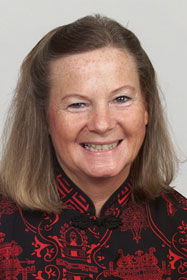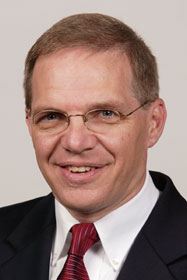The United Methodist Church's top legislative body next spring will take up a recommended 2013-16 budget of more than $90 million to support the denomination's 157 active and retired bishops.
The Episcopal Fund, paid for by congregational giving, supports the salaries, housing, travel and other expenses of active bishops as well as the salaries and benefits of some of their support staff. The fund also provides for retired bishops, surviving spouses and minor children of deceased bishops.
The proposed budget - which the General Council on Finance and Administration set at $90,336,000 - represents a decrease of nearly $4 million, or about 4 percent, from the budget for 2009-12.
The recommended cut is part of a number of budget reductions the General Council on Finance and Administration has proposed for general church operations. The proposed cutbacks come after decades of declining membership in the United States. The denomination's finance agency also projects that total giving, exclusive of debt payments and local church benevolences, will flatten in the coming four years.
The U.S. membership supports more than 95 percent of what the denomination budgets to support general church ministries around the world.
Meeting the bishops' expenses will require drawing down $6 million from the Episcopal Fund's reserves, Los Angeles Area Bishop Mary Ann Swenson told the Council of Bishops at its fall meeting Nov. 4. Swenson is the chair of the finance committee of the Council of Bishops.
The Council of Bishops has accumulated about $12 million in reserves from cost savings over the past seven years.
Some bishops expressed concern that spending reserves would make the bishops appear to be failing to be good stewards.
"That's going to reflect on the bishops' budget significantly in the 2016 quadrennium and beyond," said Washington Area Bishop John R. Schol, another member of the finance committee. "It will be seen by leadership and by United Methodists as the bishops not being responsible in their spending when, in fact, we're being very responsible in our spending. We've been holding down costs."
"I think we're spending our reserves appropriately," Swenson later told the United Methodist News Service. She said that if the bishops maintain their focus on good stewardship and making disciples, "then we'll accomplish what our desire is."
The General Council on Finance and Administration set the recommended budget with input from the bishops. General Conference, the denomination's top lawmaking body, will have final say on the total general church budget when it next convenes April 24-May 4, 2012, in Tampa, Fla.
Part of overall reductions
The Episcopal Fund is one of The United Methodist Church's seven apportioned funds that support general church operations; Africa University in Mutare, Zimbabwe; historically black United Methodist-related colleges and universities in the United States; and ministerial education.
The proposed reduction in the Episcopal Fund is part of the 6.04 percent overall decrease recommended by the General Council on Finance and Administration for the general church's 2013-16 budget. The General Council on Finance and Administration's proposed budget cuts the World Service Fund, which supports most general agencies, by about 6.6 percent.
The General Council on Finance and Administration has submitted to General Conference a total budget of $603 million for all seven apportioned funds.
Factors that go into budget projections include church membership, inflation, per-capita disposable income, "giving elasticity" (percent of giving from increased revenue), net spending and the U.S. gross domestic product.
The United Methodist Church now has 48 active bishops and 69 retired bishops in the United States. In the central conferences of Africa, Europe and the Philippines, the denomination has 17 active and 23 retired bishops. At present, retired bishops are temporarily serving in two episcopal areas in the central conferences and one episcopal area in the United States.
The 2012 General Conference also will consider proposals to eliminate three episcopal areas - that is, three bishop positions - in the United States and add a new episcopal area in the rapidly growing Democratic Republic of Congo.
But until General Conference votes on the decision, the Episcopal Fund budget does not reflect any of these changes, said Sharon Dean, the spokeswoman for General Council on Finance and Administration.
The full financial impact on the denomination from the proposals to eliminate episcopal areas is uncertain.
However, Dean said that using today's costs as a measurement, the estimate over four years for a residential bishop's office in the United States is about $1.25 million. Using the same numbers, the estimated cost for four years for a central conference residential bishop is about $750,000.
Holding down costs
Bishops have tried to save money in other ways. In the wake of the 2008 economic downturn, the denomination's U.S. bishops voted in 2009 to forego a raise in 2010 and roll back their pay to 2008 levels, a cut of almost $5,000.
When you put a dollar in the regular offering at your church, here is how it is currently distributed:
- 90 cents will remain at your local church for your church to decide how to spend that money
- About 8 cents will go to support programs in the district, annual (regional) conferences and jurisdictions*
- 2 cents will go to support the denomination's seven apportioned funds
Under the proposed 2013-2016 budget, the percentage of giving going to support general church operations will likely decrease, if local church apportionments increase, remain flat or only decrease slightly.
*Due to the different ways annual conferences fund their clergy pension and health benefits, the actual percentage of local church spending going to apportionments can vary significantly from conference to conference. In annual conferences were these benefits are apportioned (rather than direct billed), the percentage of all local church spending going for apportionments can range as high as 13 percent.
In January 2010, their annual pay dropped from $125,658 to $120,942.
The bishops had hoped to transfer the money trimmed from their paychecks directly from the Episcopal Fund for ministries such as the Central Conference Pension Initiative, a program providing retirement funds for clergy and their spouses in Africa, Asia and parts of Europe. But because the 2008 General Conference already had designated that money for the bishops, the savings had to remain in the Episcopal Fund. It is now part of the Episcopal Fund reserves.
The bishops' salaries were restored to the original projected amount in 2011.
All U.S. bishops receive the same salary. The specific salary is determined annually.
According to the General Council on Finance and Administration, the total projected budget for U.S. bishops' salaries for 2013-16 is $28,115,860, based on 49 bishops until the 2012 General Conference votes on the three episcopal area reductions. The total projected budget for the central conference bishops for 2013-16 is $5,684,037, based on 19 bishops until the 2012 General Conference votes on any additional episcopal areas.
In the next budget period, the bishops also will cut their budget for consultants and continuing education.
"The only way I can see that we could do even less in the Council of Bishops is by having fewer bishops," Swenson said. "You'd have bishops that would have an even larger residential territory than they do now."
*Hahn is a multimedia news reporter for United Methodist News Service.
News media contact: Heather Hahn, Nashville, Tenn., (615) 742-5470 [email protected].
Like what you're reading? Support the ministry of UM News! Your support ensures the latest denominational news, dynamic stories and informative articles will continue to connect our global community. Make a tax-deductible donation at ResourceUMC.org/GiveUMCom.






